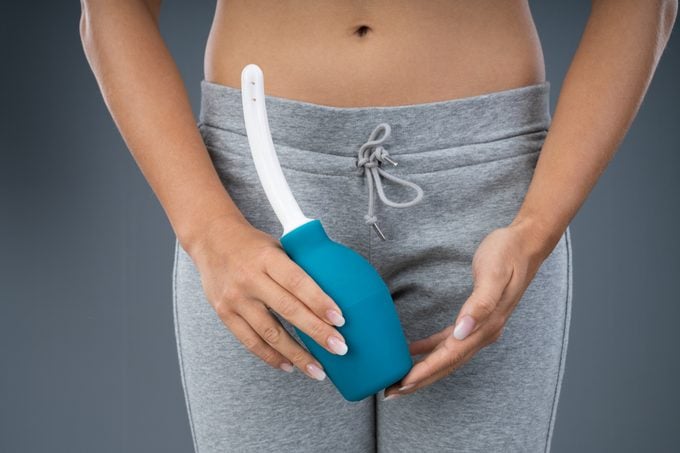Here’s Why You Should Never Douche—And What to Do Instead
Updated: Sep. 13, 2022
Douching is more common than you may realize. But is it safe? Gynecologists share what you should know about the practice—and why you (and your vagina) are better off skipping it.
Our editors and experts handpick every product we feature. We may earn a commission from your purchases.
The history of douching
Although many people know it as part of a curse word, “douche” is actually French for wash, explains Carol Dunetz, MD, a gynecologist at NYU Langone Ambulatory Care Lake Success. Vaginal douching is essentially rinsing the vagina with a liquid. And it’s a relatively common practice in the U.S. as almost one in every five women between 15 and 45 years old do so, according to the U.S. Department of Health and Human Services Office on Women’s Health (OASH).
But just because other people do it doesn’t mean you need to, or should, be douching. In fact, doing so could cause some unhealthy side effects. Here’s what you need to know about douching.
Get The Healthy @Reader’s Digest newsletter
What is douching?
Douching involves cleaning the vagina with a liquid mixture via a spray bottle or bag.
“There are various liquids such as vinegar and water, betadine, antiseptics, and fragrances,” Dr. Dunetz says. “Douches often come in a plastic container with a nozzle.”
The process starts with warming the liquid while in the shower, pulling out the nozzle, and inserting it in the vagina and squeezing the container.
6 Body Parts You Can Stop Cleaning So Often
What does douching do and not do
“Some women like to douche to eliminate vaginal odor and discharge,” Dr. Dunetz says.
A strong odor or irritation is a sign to speak to your doctor, not to douche.
Although douching more than once a week has been linked with difficulty conceiving, the practice is neither a pregnancy nor sexually transmitted disease prevention method, according to Dr. Dunetz.
9 Signs You’re on the Wrong Birth Control

Is douching safe?
There is no known, clear benefit of douching, but douching can definitely create problems, according to Dr. Dunetz.
That’s why the American College of Obstetrics and Gynecology also doesn’t recommend using douching products. And neither does Jacqueline Walters, MD, a board-certified OB-GYN and author of The Queen V.
“Thou shalt not douche—period,” she says.
“The vagina is colonized with bacteria,” Dr. Dunetz adds. “Douching can disrupt the normal vaginal flora and actually cause an overgrowth of harmful bacteria, creating a bothersome discharge.”
Essentially, trying to douche messes with the pH balance and the natural vaginal flora that help stop infections and prevent irritations. Dr. Walters says you want your vagina’s pH (the normal level of acidity present) to be between 3.8 and 4.5. Your period, sex, antibiotics, hormones and any chemicals you introduce into your vaginal ecosystem could destroy its natural pH.
Removing or reducing this healthy bacteria could lead to issues like yeast infections by creating an environment more susceptible to overgrowth. In fact, women who douche once a week are five times more likely to develop bacterial vaginosis than women who do not douche, per research in the journal Obstetrics & Gynecology.
And women who use douches may not only have a difficult time getting pregnant, but are more likely to experience early childbirth, miscarriage, and other pregnancy complications like an ectopic pregnancy, according to Epidemiologic Reviews.
Some women douche with the idea that doing so will help prevent sexually transmitted infections or diseases, but it actually makes things worse.
Douching increases a woman’s risk of pelvic inflammatory disease (PID), an infection that develops in the reproductive organs and is usually caused by STIs such as gonorrhea, chlamydia or trichomoniasis.
The same Epidemiologic Reviews found that using douching products increases a woman’s risk of PID by 73% . That’s because the process of inserting fluid could push the bacteria or infectious organisms through the cervix, allowing it to travel to the fallopian tubes and abdomen, Dr. Walter says. Untreated PID could lead to infertility.
13 Things Gynecologists Wish You Knew About Yeast Infections
How to clean your vagina
The short answer is that the vagina does not require any special cleaning. The body naturally flushes out and cleans the vagina by making mucous which washes away blood, semen and vaginal discharge, according to the OASH.
Dr. Walters says it’s like a self-cleaning oven.
“Your vagina has its own cleansing process thanks to the secretions it releases,” she says. “It also has a naturally balanced ecosystem made up of healthy bacteria that shouldn’t be disrupted.”
You can keep your vagina clean and healthy by washing externally with a mild soap that doesn’t contain fragrances, Dr. Dunetz says.
And Dr. Walters says it’s OK to use just warm water. “I tell all my patients not to let suds go past their clitoris and certainly not up inside the vagina,” she says. It’s also best to avoid scented sanitary products as they may increase the chances of getting a vaginal infection.
If you think you have vaginal odor or unusual discharge or if it changes, speak to your doctor so you can find out why, and seek any necessary treatment. It could be a sign of an STD.
“If you really have an infection that’s causing a smell, you need a diagnosis from your gynecologist to figure out the cause,” Dr. Walter says.
Just note that healthy vaginas can have a mild scent that may change throughout the day, which is perfectly normal. Don’t fall for marketing ploys or products that tell you that it should smell like flowers or something else.
For more wellness updates, follow The Healthy on Facebook, Instagram, and Twitter. Keep reading:















